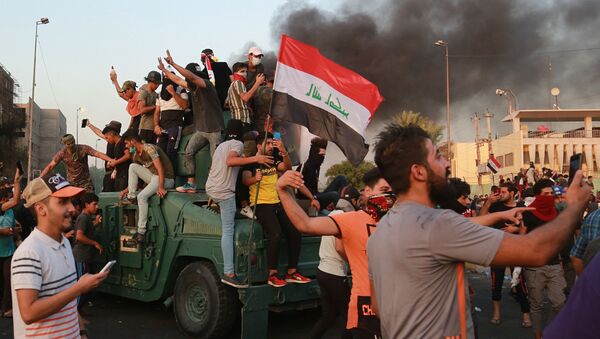Karim Wasfi, president and founder of Peace Through Arts Global Foundation and former conductor of the Iraqi National Symphony Orchestra, joined Radio Sputnik’s By Any Means Necessary Thursday to discuss the protests and the power of arts and culture to combat corruption in the country.
“I would start by saying it’s [the protests are] inevitable. The populace had been for a while looking for a public figure, for a hero, for a role model … had they not been beaten by the circumstances and the situation, we wouldn't have seen repeatedly, almost every summer, anger and in some cases maybe seeking retribution, seeking retaliation based upon anger,” Wasfi told hosts Sean Blackmon and Eugene Puryear.
“This is not a conspiracy theory. This is not an emotional analysis .. maybe there were initiatives by the five-to-six different governments that were functioning after the first elections in Iraq. The political system is a new experience in the area. It’s a different experience emotionally and culturally, being available after the invasion by another country. There are lots of paradoxes and lots of issues that would make the people think differently and process differently,” Wasfi explained.
In a statement Wednesday, Iraqi Prime Minister Adel Abdul Mahdi’s office announced that the prime minister was prepared to meet with "representatives of peaceful demonstrators to consider their legitimate demands,” Al Jazeera reported.
The demonstrations, which do not seem to be affiliated with any political party, appear to have been spurred in part by the unexplained removal of Lt. Gen. Abdul-Wahab al-Saadi, a top military commander of Iraq's elite counterterrorism forces, from his position. Saadi, who led the fight against Daesh that persisted from January 2014 until December 2017, was transferred to the Defense Ministry Friday, prompting widespread anger among Iraqis who view the military commander as a prominent figure.
“I think it will be a different case,” Wasfi said, referring to the current protests as opposed to past protests.
“Again, knowing that Iraq is the land of unpredictability isn’t much to really rationalize. Everything is expected in Iraq. But this time, [we know] it is that act that jeopardized a whole system of thinking there and had a very holistic approach towards the problems over there. So, they were not only opposing al-Saadi’s move … people are angry, relating this act to the whole perspective of the political scene. It had been discussed for a while now, in sort of different levels of approach, that a presidential system might be better for Iraq … Iraq had been known for coups for some time, so within the subconscious, which probably runs 80% of our discussions in some cases, people are willing to accept a coup,” Wasfi explained.
Wednesday evening, Mahdi announced a curfew across the capital of Baghdad amid the growing protests.
“People are angry. They were met with extreme force and deadly bullets and nerve gas without a single statement from the prime minister to address these issues. Instead there was a letter from the security council of Iraq declaring the curfew and one letter prior to that referring to some lawlessness and some acts of anger on the streets of Baghdad, which again added more anger and more lack of understanding of what the real problem is. The real problem was not limited to moving al-Saadi. Nine leaders from that force were either, within the last year, transferred or dead.”
“Ironically, this latest reason for unity was manifested so palpably and so obviously beyond sectarian differences,” Wasfi explained, noting how the protests are uniting the Iraqi people.
Wasfi’s organization, the Peace Through Arts Global Foundation, aims to promote de-radicalization and prevent violence through music and arts, according to the initiative's Facebook page. It also aims to “bridge the cultural gaps by arts by mixing and engaging diverse cultures in the area through orchestral performances.”
The role of culture and art is very important in creating equilibrium and stabilization, Wasfi noted.
“It’s a holistic, multifaceted approach, later on maybe with a healing, therapeutic role. I am very surprised that I haven't seen a single artist in the streets of Baghdad. Again, it’s a very simple code. People are supportive of public figures. They’re looking for heroes, they're looking for people to trust, they’re looking for role models. An artist can be that. And it’s not limited to people like myself who always defied the obstacles and went to war zones. Even locals who are functioning within the local scene could have a role and still do have the opportunity to share and express their stabilizing factor and to create equilibrium that is needed, and that doesn’t mean undermining the arguments of the protesters,” Wasfi explained.
“The latest elections weren’t very promising, with 23% of the society participating … Artists have a great role of enlightenment, equilibrium, stabilization and empowering resilience and protesting and expressing protest and resilience against corruption, without the need to escalate things to the level of aggressive acts of destroying public property. Arts and culture are of an innate priority and of a great necessity for stabilization and also for a transformative function that would empower the society and the community to transcend beyond the obstacles,” Wasfi noted.



